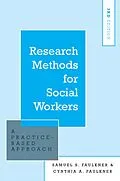From the outset, the ultimate goal of Research Methods for Social Workers has been to serve as a research text that students would be able to understand and read in full. This third edition features important additions and changes to the original text (while maintaining its accessible style). The order of chapters is re-arranged to improve the flow of introducing and developing concepts of the research process, and the authors have included some much-needed information to meet the changing and evolving standards of social work education. At its core, this book is designed to bring complex ideas down to a level that can be grasped by someone with little to no knowledge of research methods - it is an invaluable resource for social work students and anyone who wishes to have a comprehensive introduction to research methods.
Autorentext
Samuel S. Faulkner, PhD, MSSW, MS, was previously Professor of Social Work at Morehead State University before retiring in June of 2017. He is now Associate Professor at Texas A&M University-Kingsville. Cynthia A. Faulkner, PhD, MSW, LCSW, was previously Professor of Social Work at Morehead State University before retiring in June of 2017. Cindy is now Program Director for Indiana Wesleyan University's online MSW program.
Zusammenfassung
From the outset, the ultimate goal of Research Methods for Social Workers has been to serve as a research text that students would be able to understand and read in full. This third edition features important additions and changes to the original text (while maintaining its accessible style). The order of chapters is re-arranged to improve the flow of introducing and developing concepts of the research process, and the authors have included some much-needed information to meet the changing and evolving standards of social work education. At its core, this book is designed to bring complex ideas down to a level that can be grasped by someone with little to no knowledge of research methods - it is an invaluable resource for social work students and anyone who wishes to have a comprehensive introduction to research methods.
Inhalt
Preface Acknowledgments About the Authors 1: What Is Research? Importance of Social Work Research Defining Research Ways of Knowing Qualitative, Quantitative, and Mixed-Methods Research Developing Your Research Questions What Is a Hypothesis? Research Designs Strengths and Limitations of Research Case Scenario Critical Thinking Questions Key Points Practice Exam 2: Ethical Considerations Historical Overview Respect for Individuals Beneficence Justice Other Ethical Considerations Case Scenario Critical Thinking Questions Key Points Practice Exam 3: Qualitative Research Designs How Is Qualitative Research Used? Descriptive Inquiry Speculative Inquiry Qualitative Research Methods Data Collection An Example of a Qualitative Study Case Scenarios Critical Thinking Questions Key Points Practice Exam 4: Literature Review What Is a Literature Review? Step 1: Conducting Your Search for Research Articles Step 2: Choosing Your Articles Step 3: Reviewing Your Articles Step 4: Organizing Your Search Results Step 5: Developing a Problem Statement or Hypothesis Step 6: Compiling Your Reference Page Case Scenario Critical Thinking Questions Key Points Practice Exam 5: Quantitative Research Designs Getting Started Developing a Testable Hypothesis What Is Descriptive Research? Correlation Versus Causation Data Collection Cross-Sectional and Longitudinal Designs Group Research Designs Case Scenario Critical Thinking Questions Key Points Practice Exam 6: Variables and Measures Variables in Research Design Viewing and Using Variables Types of Variables What Is a Measure? Defining and Operationalizing Measures Levels of Measurement Reliability and Validity in Measurement Case Scenario Critical Thinking Questions Key Points Practice Exam 7: Sampling What Is Sampling? Random Selection and Random Assignment Sample Size: How Many Is Enough? External and Internal Validity Probability Sampling Probability Sampling Techniques Sampling Error Nonprobability Sampling Limitations of Nonprobability Sampling Case Scenario Critical Thinking Questions Key Points Practice Exam 8: Survey Research Defining Survey Research Appropriate Survey Topics Developing a Survey Administering Surveys and Expected Rates of Return Advantages and Disadvantages of Survey Research Case Scenario Critical Thinking Questions Key Points Practice Exam 9: Evaluative Research Design Program Evaluation Process Evaluation Outcome Evaluation Strengths and Weaknesses of Program Evaluation Practical Considerations and Common Problems Case Scenario Critical Thinking Questions Key Points Practice Exams 10: Single-Subject Designs What Is a Single-Subject Design? Elements of Single-Subject Design Research Types of Single-Subject Designs Strengths and Limitations of Single-Subject Designs Case Scenario Critical Thinking Questions Key Points Practice Exam 11: Introduction to Descriptive Statistics What Is Data Analysis? The First Step of Data Analysis Descriptive Analysis Strengths and Limitations of Descriptive Statistics Case Scenario Critical Thinking Questions Key Points Practice Exam 12: Introduction to Inferential Statistics What Are Inferential Statistics? Four Types of Correlation Determining the Strength of the Correlation Probability Values and Confidence Intervals Parametric Statistics Nonparametric Statistics Strengths and Limitations of Inferential Statistics Which Statistical Program Is Right for Me? Case Scenario Critical Thinking Questions Key Points Practice Exam 13: Practicing Your Research Skills Example of a Research Proposal Example of a Research Report Answers to Practice Exams Glossary References Index
